University Nursing: Reflection on Active Listening Skills
VerifiedAdded on 2022/10/18
|6
|1140
|294
Journal and Reflective Writing
AI Summary
This assignment is a reflective journal entry by a nursing student, focusing on the concept of active listening learned during week 2 of their course. The student details their initial understanding of communication and how it evolved after the class. They discuss the key attributes of active listening, the evidence supporting its benefits for healthcare professionals, and the 'LISTEN' acronym as a useful teaching tool. The student reflects on the importance of active listening in nurse-patient communication, emphasizing its role in maintaining equitable care and facilitating patient expression of needs. They evaluate the lessons, analyze their learning experience through reflective exercises, and highlight the significance of non-verbal cues. The student concludes by outlining an action plan for further professional development, including training on active listening, simulation participation, and honing research skills. References to relevant research papers are also included.
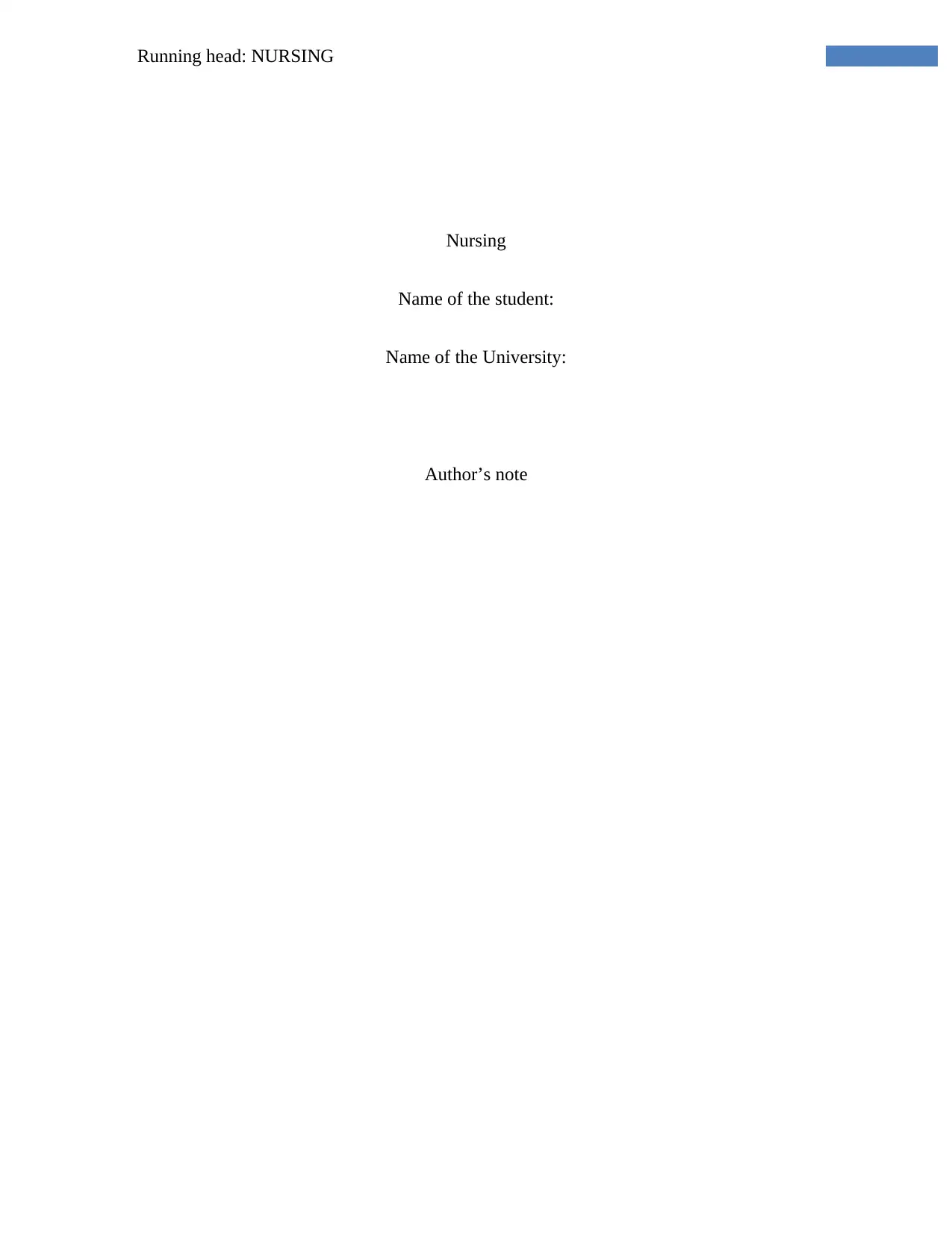
Running head: NURSING
Nursing
Name of the student:
Name of the University:
Author’s note
Nursing
Name of the student:
Name of the University:
Author’s note
Paraphrase This Document
Need a fresh take? Get an instant paraphrase of this document with our AI Paraphraser
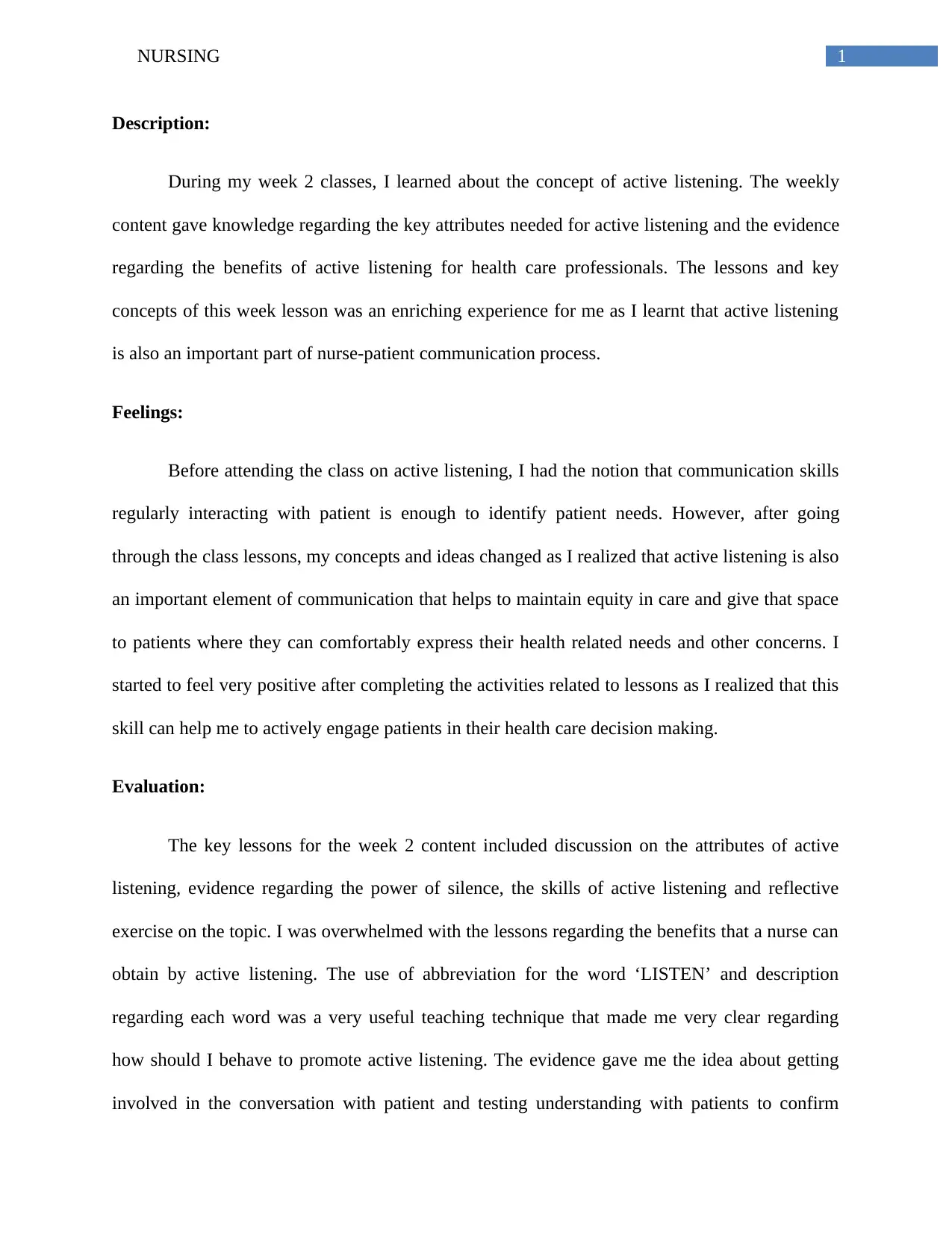
1NURSING
Description:
During my week 2 classes, I learned about the concept of active listening. The weekly
content gave knowledge regarding the key attributes needed for active listening and the evidence
regarding the benefits of active listening for health care professionals. The lessons and key
concepts of this week lesson was an enriching experience for me as I learnt that active listening
is also an important part of nurse-patient communication process.
Feelings:
Before attending the class on active listening, I had the notion that communication skills
regularly interacting with patient is enough to identify patient needs. However, after going
through the class lessons, my concepts and ideas changed as I realized that active listening is also
an important element of communication that helps to maintain equity in care and give that space
to patients where they can comfortably express their health related needs and other concerns. I
started to feel very positive after completing the activities related to lessons as I realized that this
skill can help me to actively engage patients in their health care decision making.
Evaluation:
The key lessons for the week 2 content included discussion on the attributes of active
listening, evidence regarding the power of silence, the skills of active listening and reflective
exercise on the topic. I was overwhelmed with the lessons regarding the benefits that a nurse can
obtain by active listening. The use of abbreviation for the word ‘LISTEN’ and description
regarding each word was a very useful teaching technique that made me very clear regarding
how should I behave to promote active listening. The evidence gave me the idea about getting
involved in the conversation with patient and testing understanding with patients to confirm
Description:
During my week 2 classes, I learned about the concept of active listening. The weekly
content gave knowledge regarding the key attributes needed for active listening and the evidence
regarding the benefits of active listening for health care professionals. The lessons and key
concepts of this week lesson was an enriching experience for me as I learnt that active listening
is also an important part of nurse-patient communication process.
Feelings:
Before attending the class on active listening, I had the notion that communication skills
regularly interacting with patient is enough to identify patient needs. However, after going
through the class lessons, my concepts and ideas changed as I realized that active listening is also
an important element of communication that helps to maintain equity in care and give that space
to patients where they can comfortably express their health related needs and other concerns. I
started to feel very positive after completing the activities related to lessons as I realized that this
skill can help me to actively engage patients in their health care decision making.
Evaluation:
The key lessons for the week 2 content included discussion on the attributes of active
listening, evidence regarding the power of silence, the skills of active listening and reflective
exercise on the topic. I was overwhelmed with the lessons regarding the benefits that a nurse can
obtain by active listening. The use of abbreviation for the word ‘LISTEN’ and description
regarding each word was a very useful teaching technique that made me very clear regarding
how should I behave to promote active listening. The evidence gave me the idea about getting
involved in the conversation with patient and testing understanding with patients to confirm
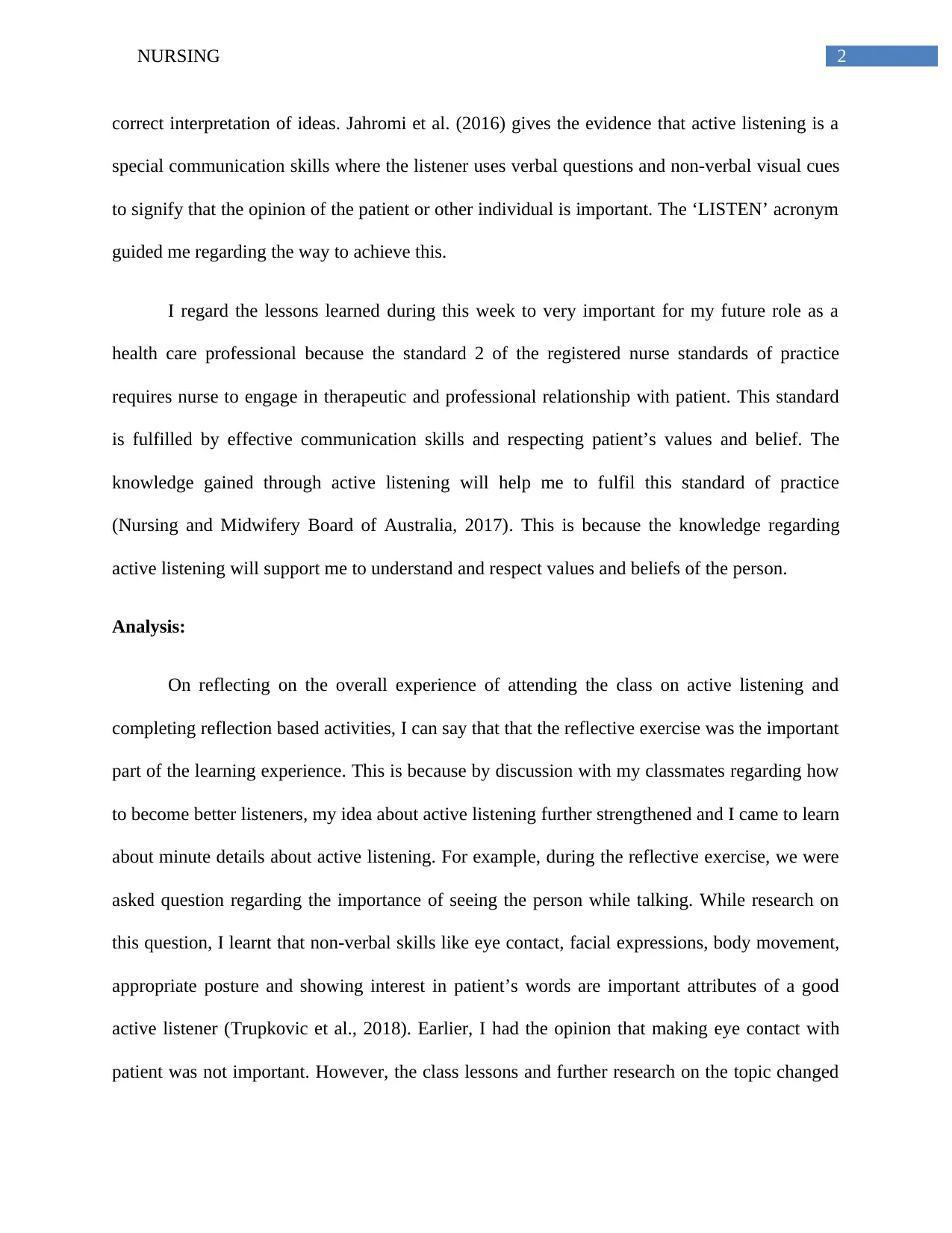
2NURSING
correct interpretation of ideas. Jahromi et al. (2016) gives the evidence that active listening is a
special communication skills where the listener uses verbal questions and non-verbal visual cues
to signify that the opinion of the patient or other individual is important. The ‘LISTEN’ acronym
guided me regarding the way to achieve this.
I regard the lessons learned during this week to very important for my future role as a
health care professional because the standard 2 of the registered nurse standards of practice
requires nurse to engage in therapeutic and professional relationship with patient. This standard
is fulfilled by effective communication skills and respecting patient’s values and belief. The
knowledge gained through active listening will help me to fulfil this standard of practice
(Nursing and Midwifery Board of Australia, 2017). This is because the knowledge regarding
active listening will support me to understand and respect values and beliefs of the person.
Analysis:
On reflecting on the overall experience of attending the class on active listening and
completing reflection based activities, I can say that that the reflective exercise was the important
part of the learning experience. This is because by discussion with my classmates regarding how
to become better listeners, my idea about active listening further strengthened and I came to learn
about minute details about active listening. For example, during the reflective exercise, we were
asked question regarding the importance of seeing the person while talking. While research on
this question, I learnt that non-verbal skills like eye contact, facial expressions, body movement,
appropriate posture and showing interest in patient’s words are important attributes of a good
active listener (Trupkovic et al., 2018). Earlier, I had the opinion that making eye contact with
patient was not important. However, the class lessons and further research on the topic changed
correct interpretation of ideas. Jahromi et al. (2016) gives the evidence that active listening is a
special communication skills where the listener uses verbal questions and non-verbal visual cues
to signify that the opinion of the patient or other individual is important. The ‘LISTEN’ acronym
guided me regarding the way to achieve this.
I regard the lessons learned during this week to very important for my future role as a
health care professional because the standard 2 of the registered nurse standards of practice
requires nurse to engage in therapeutic and professional relationship with patient. This standard
is fulfilled by effective communication skills and respecting patient’s values and belief. The
knowledge gained through active listening will help me to fulfil this standard of practice
(Nursing and Midwifery Board of Australia, 2017). This is because the knowledge regarding
active listening will support me to understand and respect values and beliefs of the person.
Analysis:
On reflecting on the overall experience of attending the class on active listening and
completing reflection based activities, I can say that that the reflective exercise was the important
part of the learning experience. This is because by discussion with my classmates regarding how
to become better listeners, my idea about active listening further strengthened and I came to learn
about minute details about active listening. For example, during the reflective exercise, we were
asked question regarding the importance of seeing the person while talking. While research on
this question, I learnt that non-verbal skills like eye contact, facial expressions, body movement,
appropriate posture and showing interest in patient’s words are important attributes of a good
active listener (Trupkovic et al., 2018). Earlier, I had the opinion that making eye contact with
patient was not important. However, the class lessons and further research on the topic changed
⊘ This is a preview!⊘
Do you want full access?
Subscribe today to unlock all pages.

Trusted by 1+ million students worldwide
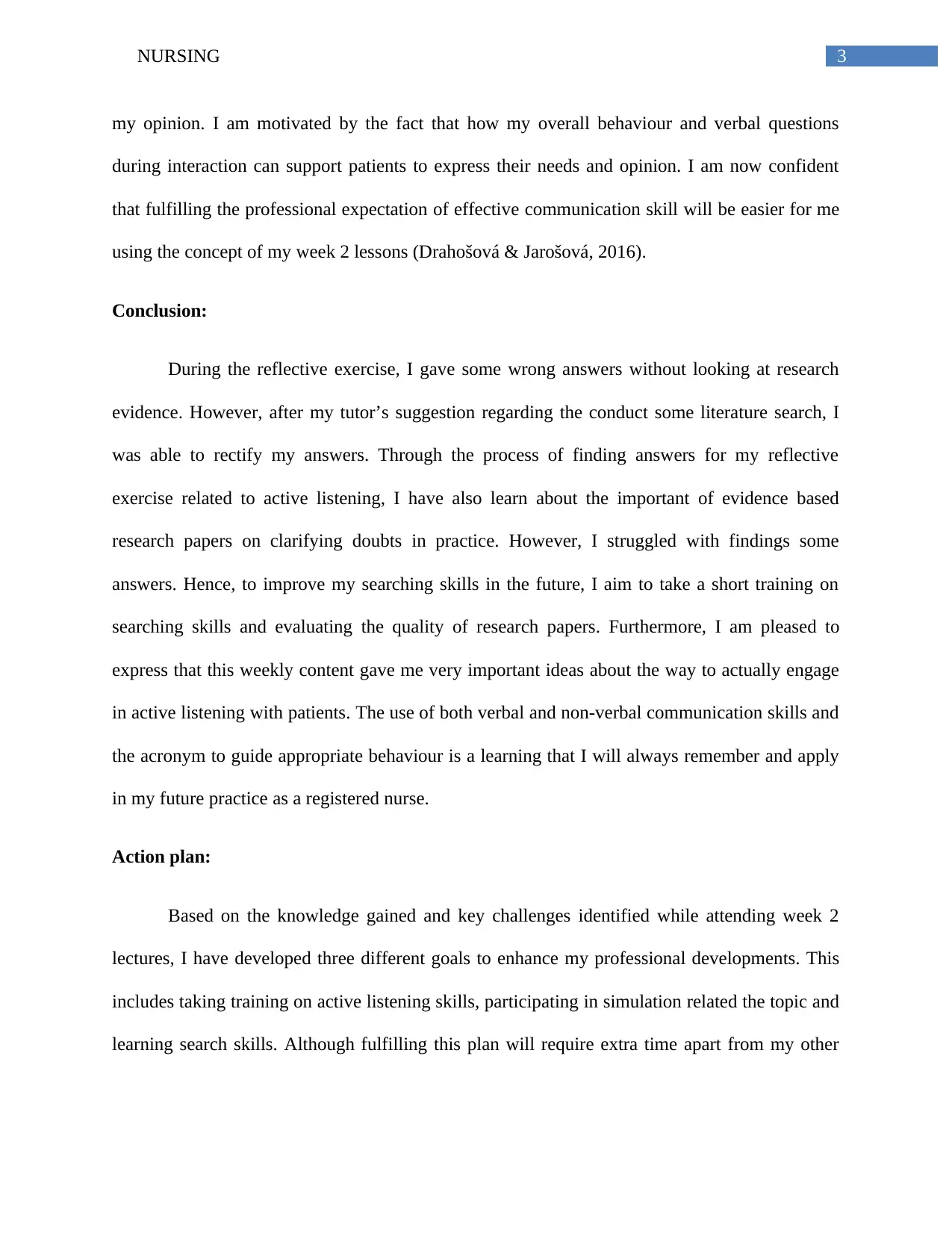
3NURSING
my opinion. I am motivated by the fact that how my overall behaviour and verbal questions
during interaction can support patients to express their needs and opinion. I am now confident
that fulfilling the professional expectation of effective communication skill will be easier for me
using the concept of my week 2 lessons (Drahošová & Jarošová, 2016).
Conclusion:
During the reflective exercise, I gave some wrong answers without looking at research
evidence. However, after my tutor’s suggestion regarding the conduct some literature search, I
was able to rectify my answers. Through the process of finding answers for my reflective
exercise related to active listening, I have also learn about the important of evidence based
research papers on clarifying doubts in practice. However, I struggled with findings some
answers. Hence, to improve my searching skills in the future, I aim to take a short training on
searching skills and evaluating the quality of research papers. Furthermore, I am pleased to
express that this weekly content gave me very important ideas about the way to actually engage
in active listening with patients. The use of both verbal and non-verbal communication skills and
the acronym to guide appropriate behaviour is a learning that I will always remember and apply
in my future practice as a registered nurse.
Action plan:
Based on the knowledge gained and key challenges identified while attending week 2
lectures, I have developed three different goals to enhance my professional developments. This
includes taking training on active listening skills, participating in simulation related the topic and
learning search skills. Although fulfilling this plan will require extra time apart from my other
my opinion. I am motivated by the fact that how my overall behaviour and verbal questions
during interaction can support patients to express their needs and opinion. I am now confident
that fulfilling the professional expectation of effective communication skill will be easier for me
using the concept of my week 2 lessons (Drahošová & Jarošová, 2016).
Conclusion:
During the reflective exercise, I gave some wrong answers without looking at research
evidence. However, after my tutor’s suggestion regarding the conduct some literature search, I
was able to rectify my answers. Through the process of finding answers for my reflective
exercise related to active listening, I have also learn about the important of evidence based
research papers on clarifying doubts in practice. However, I struggled with findings some
answers. Hence, to improve my searching skills in the future, I aim to take a short training on
searching skills and evaluating the quality of research papers. Furthermore, I am pleased to
express that this weekly content gave me very important ideas about the way to actually engage
in active listening with patients. The use of both verbal and non-verbal communication skills and
the acronym to guide appropriate behaviour is a learning that I will always remember and apply
in my future practice as a registered nurse.
Action plan:
Based on the knowledge gained and key challenges identified while attending week 2
lectures, I have developed three different goals to enhance my professional developments. This
includes taking training on active listening skills, participating in simulation related the topic and
learning search skills. Although fulfilling this plan will require extra time apart from my other
Paraphrase This Document
Need a fresh take? Get an instant paraphrase of this document with our AI Paraphraser
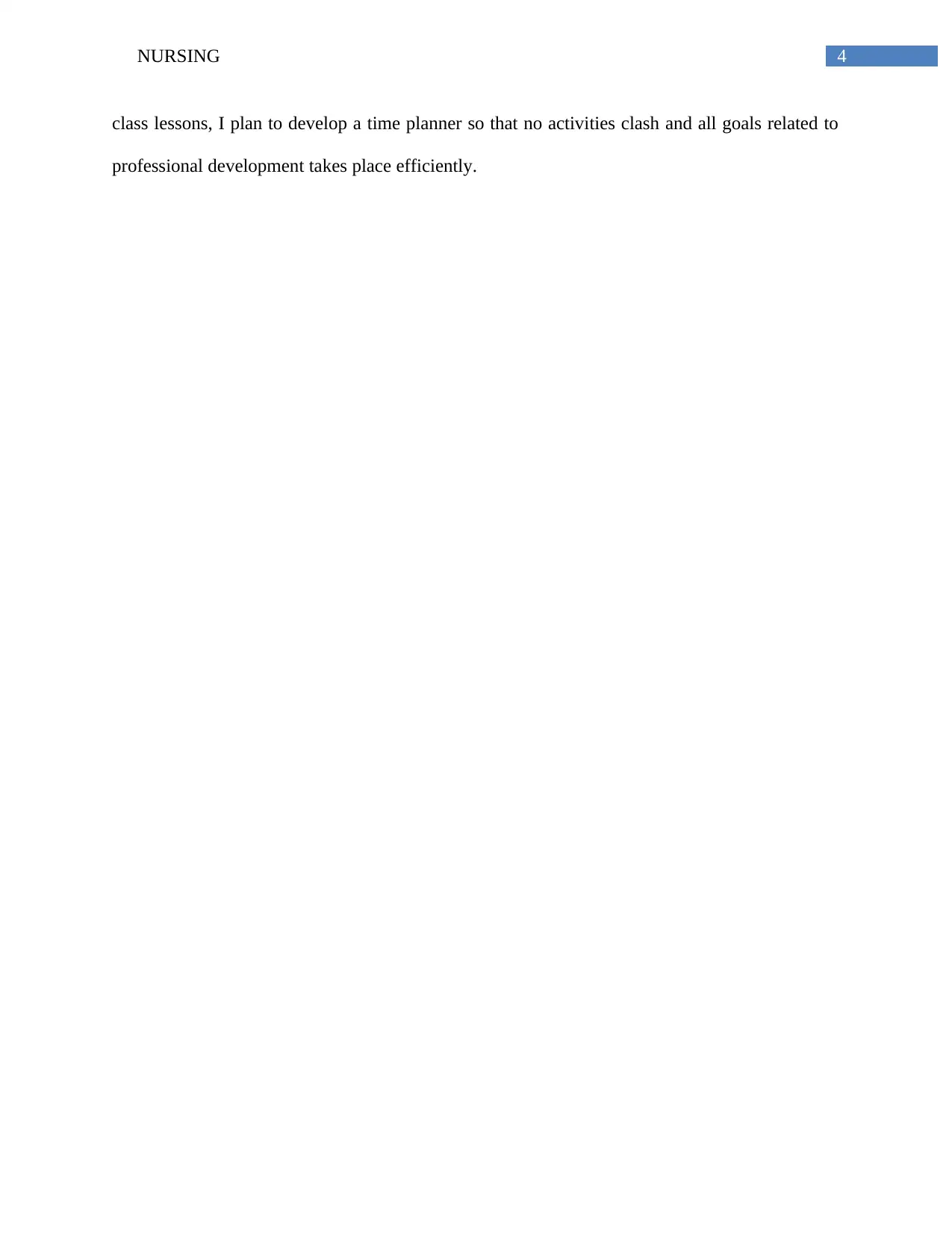
4NURSING
class lessons, I plan to develop a time planner so that no activities clash and all goals related to
professional development takes place efficiently.
class lessons, I plan to develop a time planner so that no activities clash and all goals related to
professional development takes place efficiently.
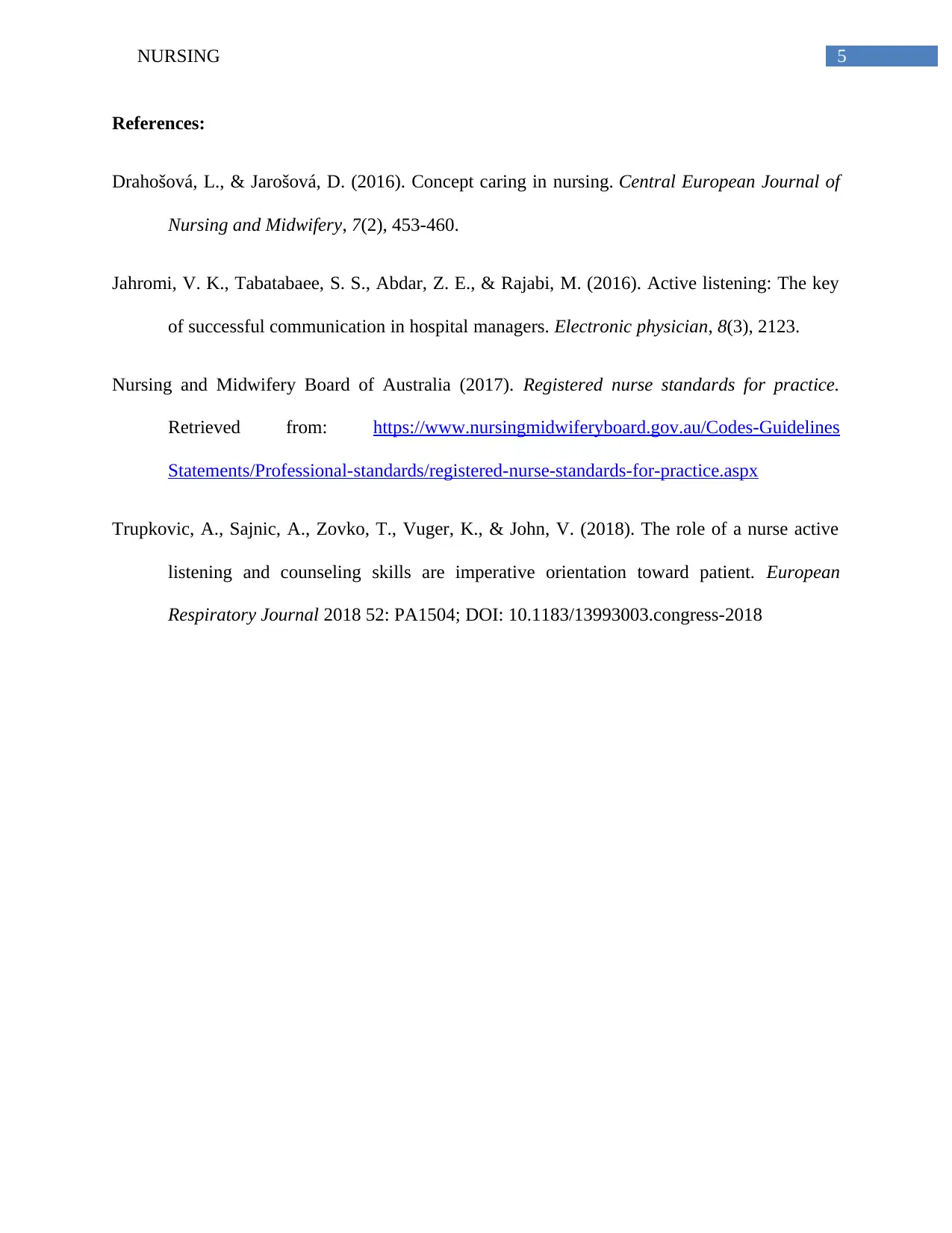
5NURSING
References:
Drahošová, L., & Jarošová, D. (2016). Concept caring in nursing. Central European Journal of
Nursing and Midwifery, 7(2), 453-460.
Jahromi, V. K., Tabatabaee, S. S., Abdar, Z. E., & Rajabi, M. (2016). Active listening: The key
of successful communication in hospital managers. Electronic physician, 8(3), 2123.
Nursing and Midwifery Board of Australia (2017). Registered nurse standards for practice.
Retrieved from: https://www.nursingmidwiferyboard.gov.au/Codes-Guidelines
Statements/Professional-standards/registered-nurse-standards-for-practice.aspx
Trupkovic, A., Sajnic, A., Zovko, T., Vuger, K., & John, V. (2018). The role of a nurse active
listening and counseling skills are imperative orientation toward patient. European
Respiratory Journal 2018 52: PA1504; DOI: 10.1183/13993003.congress-2018
References:
Drahošová, L., & Jarošová, D. (2016). Concept caring in nursing. Central European Journal of
Nursing and Midwifery, 7(2), 453-460.
Jahromi, V. K., Tabatabaee, S. S., Abdar, Z. E., & Rajabi, M. (2016). Active listening: The key
of successful communication in hospital managers. Electronic physician, 8(3), 2123.
Nursing and Midwifery Board of Australia (2017). Registered nurse standards for practice.
Retrieved from: https://www.nursingmidwiferyboard.gov.au/Codes-Guidelines
Statements/Professional-standards/registered-nurse-standards-for-practice.aspx
Trupkovic, A., Sajnic, A., Zovko, T., Vuger, K., & John, V. (2018). The role of a nurse active
listening and counseling skills are imperative orientation toward patient. European
Respiratory Journal 2018 52: PA1504; DOI: 10.1183/13993003.congress-2018
⊘ This is a preview!⊘
Do you want full access?
Subscribe today to unlock all pages.

Trusted by 1+ million students worldwide
1 out of 6
Related Documents
Your All-in-One AI-Powered Toolkit for Academic Success.
+13062052269
info@desklib.com
Available 24*7 on WhatsApp / Email
![[object Object]](/_next/static/media/star-bottom.7253800d.svg)
Unlock your academic potential
Copyright © 2020–2026 A2Z Services. All Rights Reserved. Developed and managed by ZUCOL.





